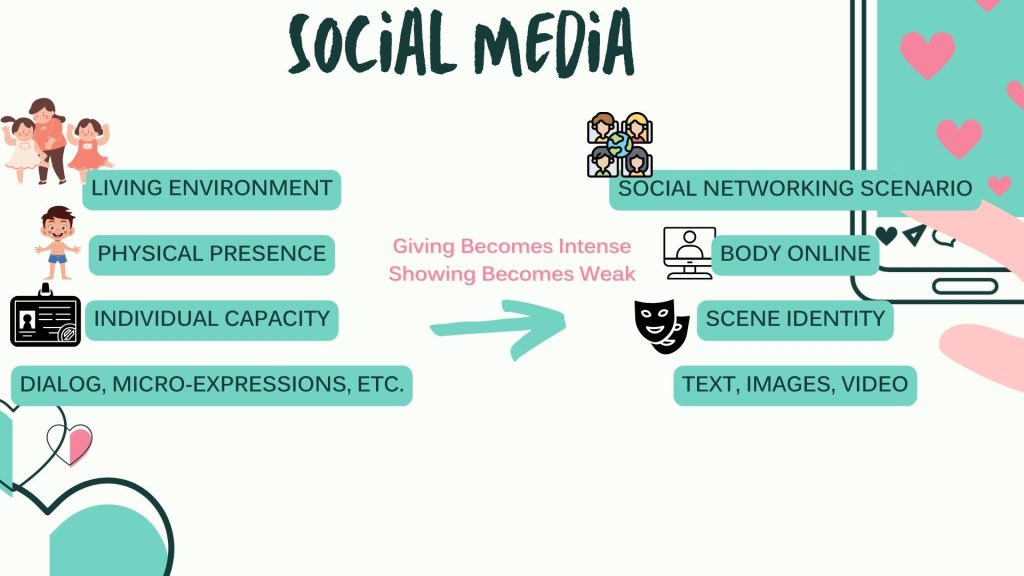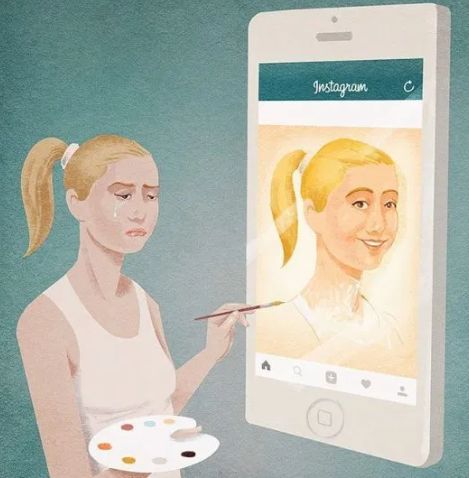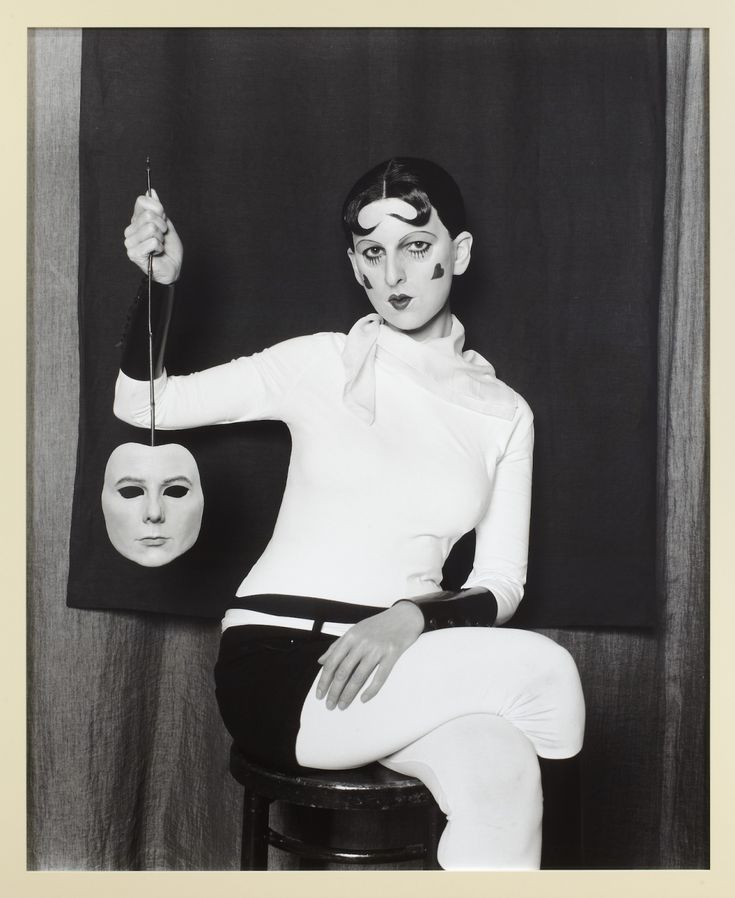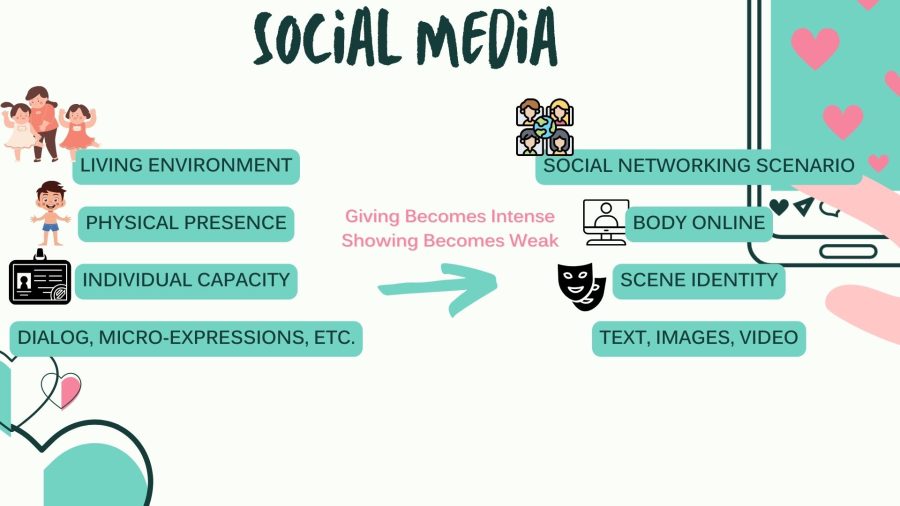Identity construction in the
new media (network society) environment

Xinru Cheng/Eliza
11.6 5min
BACKGROUND

The blurring of the boundaries of Dramaturgy elements in the network society
The theory of Dramaturgy( wikipedia,2023 )is still applicable in the network society, but the network society transforms different scene patterns every moment, blurring the demarcation line of its elements in the original social scene, and blurring the line of differentiation between front-stage and back stage, which results in the blurring of the identity authentication of its performers.
CONCRETE EXPRESSION
1. The boundaries of the “perfect performance frame” are blurred.
The network society is a highly “liberalized” society, and the “anonymity” of the network can hide all or part of the participants’ real identities. People can have different “voices”, so there are many differences in their personal values and judgmental criteria of events, which cause performers to constantly change their performance frames according to these “voices”, trying to present a perfect image. Each person has a different frame of mind, and it is difficult to define the boundaries of the most correct frame of performance.
2. “Widespread marginalization” of regions
According to Goffman, regions are places that are limited by some degree of perceptual barriers. Regions vary according to the degree of restriction and the medium of communication that produces the perceptual barrier.( ) It focuses on the influence of the medium of communication on the region. In the network society, the media platforms used by performers to communicate are even more diversified, and people are constantly changing their roles according to different platforms, jumping back and forth from one platform to another, resulting in the phenomenon of “extensive marginalization” of the region.
3. The boundary of “performer identification” is blurred.
Impression management in the online society mainly refers to the performer’s use of text, pictures, videos and other content to perfect the image of the character he or she is trying to portray. However, in fact, people can no longer distinguish between the image that performers try to present online and their real image, and the boundary of the public’s identification of performers’ identity has been blurred.

CONCLUSION
In the network society, rapidity and timeliness are the main characteristics of information dissemination, which may be in one scene one second, but in the next second it has been quickly transferred to another scene due to the change of information. However, the general public believes that it is always a unified “I”. Therefore, it is a kind of spatial dislocation to adapt the behavioral rules of the past scene to the present scene, and the perfect performance framework identified by “I” has long been outdated and is no longer suitable for the present “I”.
Nowadays, with the gradual deepening of information transparency on the Internet, people are even more curious about peeking into other people’s backstage privacy. Thus, the backstage area has become another “new demo” scene for frontstage performances. Frontstage and backstage are sometimes displaced from each other in the network society, and sometimes return to the original normal situation, resulting in a “widely marginalized” situation of their regional demarcation line.
The blurring of the boundaries of the performer’s identity is directly related to the fact that the public recognizes the performer’s image through online media. The image of the performer that the audience receives in the online media is not the performer’s “original face,” but rather the “shadow” of the performer’s image reflected through the changing “mirror” of the online media. “This is impression management in the network society.
REFERENCE
- Goffman,E,1990,The Presentation of Self in Everyday Life. London:Bantam Press
- WEIKI(2023)Dramaturgy (sociology), Available at:https://en.wikipedia.org/wiki/Dramaturgy_(sociology)(Accessed: 6 Nomember 2023)
- YouTube,Sociology Live!(@sociologylive4343),2015,’Dramaturgical Analysis ‘, Available at:https://youtu.be/5Qe5TI__ZDU?si=lzV_5PM4EznGMS-i(Accessed: 6 Nomember 2023)


I like your blog, your title attracts me, the definition explains your topic well, and you list three categories. Looking forward to your next blog.
Hello Xinru, wonderful structure!!
I really enjoyed reading your post, I think it is easy to read and understand thanks to the way you have expressed the topic. Honestly I found a very good information in your post. However, I would have liked to read some current examples to link all this information with today’s digital age.
I think you have done a great job and I can see that you have spent time looking for information and doing research to share with us your knowledge of the topic.
The point you want to express can be clearly seen from the page, and the social media is particularly clear. The ethics of drama studies let me know the image I show in the society and my real image. Each of us has lost ourselves by performing in different occasions, and we have to wear a mask in the current society.
Your title is very interesting, and the characteristics of people on the internet listed in your blog are very constructive.
Hi Xinru! The title of your post “I didn’t realize you had two faces!” made me want to click in and read it, it’s a really interesting and engaging blog! You have clearly expressed your point of view, using theories from theatre studies to illustrate the idea that individuals can lose themselves in the different images they present on social media, and it made me think about it. Thank you for this blog you write very interestingly:)
As you said, referring to goffman’s theory, regions will vary according to the degree of restriction. This is amplified by the freedom of the Internet.
In addition, what you wrote in the end is that as the Internet gets better at hiding information, people’s curiosity about prying into other people’s privacy will increase, which I strongly agree with. In my opinion, this is not a good phenomenon and needs to be effectively controlled by media doorkeepers.